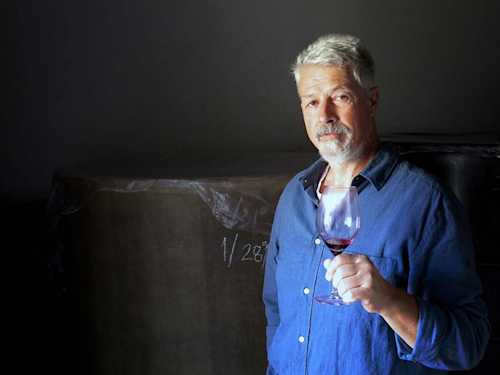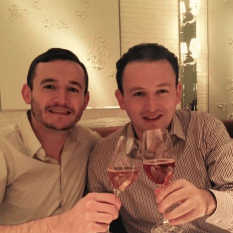
On wine’s meaning for others
Whether love, loss, or longing, there are various reasons why a particular wine resonates with an individual. It could be a reminder of a journey or a specific occasion on which it is drunk. The extent to which such meaning can be conveyed to others is a question of sincerity and openness; and the willingness to cross one’s boundaries to savour something new.
I usually loathe themed dinner parties, whether intended to create a certain aesthetic or atmosphere. Black and white dress codes, murder mysteries, you name it. This, however, was very different, though in ways I didn’t initially appreciate. ‘Bring a wine that has a special meaning for you’, were the clear and concise instructions of our host, Tamara.
After the stresses and strains of the pandemic in Serbia, this was the first opportunity to gather with friends and to drink to the future. There was a tingle of anticipation and even a little nervousness about whether we'd retained our social capabilities. Wine was needed to lubricate the larynx and make us comfortable with proximity.
Selecting a suitable bottle typically requires careful deliberation, plus a helping hand from the wine retailer’s fountain of knowledge. Leaving aside price considerations, one needs to consider the risk tolerance of the host and their other guests. For many, the final decision will often depend upon whether the wine’s contents will be liberated that evening or settled in the cellar for another occasion, one to which you may or may not be invited.
Here, however, there were no such dilemmas. One’s choice was to be guided by what that particular wine meant to you. There were no other considerations. It was a unique and liberating prospect. Nevertheless, I took the liberty of picking two bottles for profound and distinct reasons, including my indecisiveness.
The first wine was designed to enlighten, or at least provoke a reaction; to demonstrate to a skeptical audience that natural wine was not only drinkable but also innovative and exciting. Wine helps confront prejudices - both our own and those of others - about people, places, and varieties; about what is possible from carefully nurtured lands that some might look upon with skepticism.
Oskar Maurer is spearheading Serbia’s natural winemaking revolution from his vineyards in the northern part of the country. His ‘Crazy Lud’, with a startled chicken on the label, is an amber wine made from a dizzying array of varieties, including Bakator, Italijanski Rizling, and Sremska Zelenika, macerated for twenty-four hours. It positively glowed in the bottle, as on the palates of the assembled, some of whom happily expressed their surprise. Natural wine remains divisive, and the best way to overcome such divisions is through exciting winemakers like Oskar.
Their doubts allayed, we moved on to the second, more poignant, wine. Dragoslav ‘Gaga’ Ivanović introduced me to the potential of Serbian wine, particularly Prokupac and Tamjanika in which he excelled. I’d enjoyed his hospitality in the Župa wine region, including one famous occasion that my brother and I fondly recall over a decade on. Such memories age well.
Tragically, he died far too young; though not before he could nurture the talents of his son, Ivan, who today continues the family legacy. We raised our glasses of Number ½ - his cuvee of Prokupac (50%), Cabernet Sauvignon (25%), and Merlot (25%) - to Gaga’s memory. Winemakers are artists, and he was one of the masters. Their loss is felt by those who never had the chance to meet them; their works will be celebrated for decades to come.
For Jean-Luc, the co-host, it was a night of longing for his beloved that inspired his unusual choice of a Bovin Imperator Vranec from North Macedonia. Drowning his sorrows while being regaled by the great and the good of Vranje, a small town in south Serbia, renowned for its traditional folk music, this wine became synonymous with the promise of reunification; provided he could survive the subsequent hangover.
The schoolboyish glow of his cheeks provided a glimpse of endearment that the aversion of eye contact could not hide; each sip embodied a reassertion of that love. It was a novel and cunning gesture; tipsiness justified as a declaration of affection. To abstain from another pour would be an affront to the heart.
Giovanni, a keen sailor, more comfortable in the bracing ‘bura’ winds that buffer the Adriatic Sea than the smoggy Belgrade skies, brought a wine from Serbia aged for eight months in those same waters, off the coast of neighbouring Croatia, thirty meters below sea level.
The minerality of Grand Trianon Deux Mers from Erdevik Vinarija - the second sea being that of the ancient Pannonian, under which the vineyards once lay over a million years ago - transported us to the shoreline. Together we were drenched in the sea breeze and refreshed by the prospect of a quick dip. We travelled together on the bobbing waves from the comfort of the kitchen table, enjoying the sunset and ignoring the impending storm.
The evening was a timely reminder that wine is a highly personal thing. For all the fruity - and some would say frivolous - descriptors, it is the meaning attached to a particular bottle that provides a layer of appreciation that builds upon the endeavours of the winemaker; a unique, indelible signature that goes beyond the sentiments expressed on the label or by wine critics.
Whether love, loss, or longing, there are various reasons why a particular wine resonates with an individual. It could be a reminder of a journey or a specific occasion on which it is drunk. The extent to which such meaning can be conveyed to others is a question of sincerity and openness; and the willingness to cross one’s boundaries to savour something new.
Among friends, such appreciation comes naturally; there are no barriers to penetrate. With strangers, wine and its meaning can forge new bonds of camaraderie. For wine is more than an object to be consumed, it is a common language to be nourished and shared.
Ian Bancroft is the author of ‘Dragon’s teeth - tales from north Kosovo’ and ‘Luka'.
Ian is a writer based in the Balkans. He is the author of 'Dragon's Teeth - Tales from North Kosovo' and 'Luka'. Follow Ian on Twitter @bancroftian.
Currently in: Belgrade, Serbia — @bancroftian
